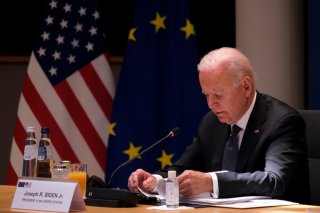America’s Foreign Policy Isn’t Normal
We are not entering an abnormal period in geopolitics but rather exiting an irregular period and entering something more typical of the historical experience.
From Ukraine to Israel to multiple West African states, the public is bombarded with news of an international situation in the process of breaking down. Laments of a collapsing world order frame this as a global challenge to be met with vigilance as the supposedly normal and stable world gives way to barbarism. This rhetoric misses two very important things; the first is that it is usually in the interests of the great powers to compartmentalize conflict rather than globalize it. Second, the times we are exiting were historically more abnormal than where we seem to be heading. We are not entering a strange time but instead leaving an uncanny period into something more typical of the historical experience. The problem is that many in the policymaking and commentary classes are made up of people whose concept of normality is very much abnormal.
So much of what makes up “The Terrible Twenties” so far is, in fact, quite familiar to the historian. Pandemics, wars, and sectarian chaos (known in present-day terminology as culture war) are only perplexing events from the perspective of those conditioned by an outlier period of prosperity, seemingly endless growth, and relative political stability. The only new variables are the speed at which information moves across the world and the related tendency of large groups of people to internalize the struggles of others. Unfortunately for global stability, this behavior is not simply limited to social media clout chasers but is also becoming more common amongst governments and how they conceptualize their roles abroad. In the rhetoric of the North Atlantic commentariat, for example, there seem to be only two periods of human history worth referencing compared to contemporary events: World War II and the 1990s. According to this view, the Second World War is both a state of nature—a time nasty, brutish, and never to be returned to—and an existential battle of universal morality. The conflicts’ sacrifices nonetheless enable the post-Cold War normality of 1991–2001.
But both of these periods are intense outliers in human history, and the numerous international conflicts of the nineties, such as the Congo Wars, The Badme War, the Somali state collapse, the First Karabakh War, and the Balkan Wars show even the outlier cannot be romanticized. The real story of geopolitical history is one of occasionally structured chaos, moral ambiguity, and more localized and quotidian concerns of survival and pragmatic adaptation. Sometimes, ideologues allow world views to reframe these struggles as grand binaries of battles of darkness and light. Still, inevitably, reality makes policymakers return to their senses once such euphoria wears out its welcome.
Stephen Pinker and other contemporary prophets of progress use selective data and ignore the reliably dismal experience of their intellectual predecessors to make a case that the inevitable path of humanity is one of reason and eternal growth under conditions of Western enlightenment. The very non-liberal state of China is behind 75 percent of global poverty reduction, according to the World Bank, a point that would undermine the assumed convergence of humanity under a unified (and implicitly liberal-internationalist) world order. While battlefield deaths as a proportion of conflict participants may appear to be going down in the recent past (something which could change), the reach of conflict is expanding, setting up a situation where the ability for more societies to become entangled in the wars of others increases. All of this unfolds against the backdrop of grave and potentially irreversible environmental degradation.
Meanwhile, supposedly savvy entertainers like Aaron Sorkin create a pleasing narrative for the policy wonk classes where the political establishment’s obsession with technocracy is not the cause of their own decline through deindustrialization at home and over-expansion abroad but rather a romanticized normality. Unable to take refuge in history for their worldview, the historically abnormal political and managerial classes must resort to self-flattering fanfiction to justify their increasingly unstable grasp on the narrative.
As the great powers of the world consider escalating regionally limited conflicts in Eastern Europe and the Middle East, it would be wise to keep in mind that the actual global challenge right now is keeping one’s head and thinking rationally. Localized conflicts do not need to be expanded into global ones but rather contained. Ambiguous conspiracies of “authoritarians” marching in ideological lockstep to roll back a liberal world should be discarded in favor of understanding the genuine and material reality that great power influence over middle-tier nations is decreasing, particularly in regions with strong and anchored regional powers. Turkey’s say in the Middle East now counts for as much, if not more, than the United States, and the same applies to India and South Asia.
In a world with greater localization of powers, there will also inevitably be a greater localization of values. This makes claims to universal order not only farcical but dangerous and escalatory. Regional conflicts could be contained rather than spread by great powers, but nuclear war and endlessly expanding proxy conflicts know no such limits. This is why it is of utmost importance to acknowledge that regional war and rivalry are, in fact, the normal conditions of history. Rather than meet this challenge with panic at the loss of a once more predictable past, it is time to return caution and prudence to the forefront of navigating a more unpredictable—yet very much historically typical—reality. In a world where nothing lasts forever, pragmatic adaptability is the crucial virtue of statecraft.
Christopher Mott is a Research Fellow at the Institute for Peace and Diplomacy and the author of The Formless Empire: A Short History of Diplomacy and Warfare in Central Asia. He holds a doctorate in International Relations from the University of St. Andrews and has previously worked for the U.S. Department of State.
Image: Shutterstock.

